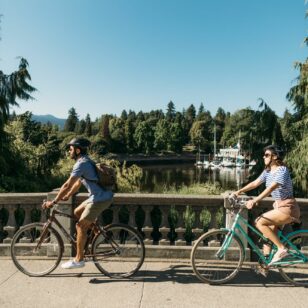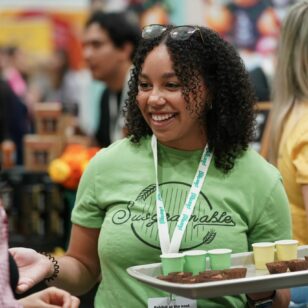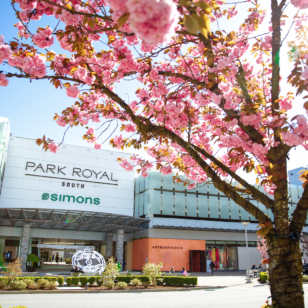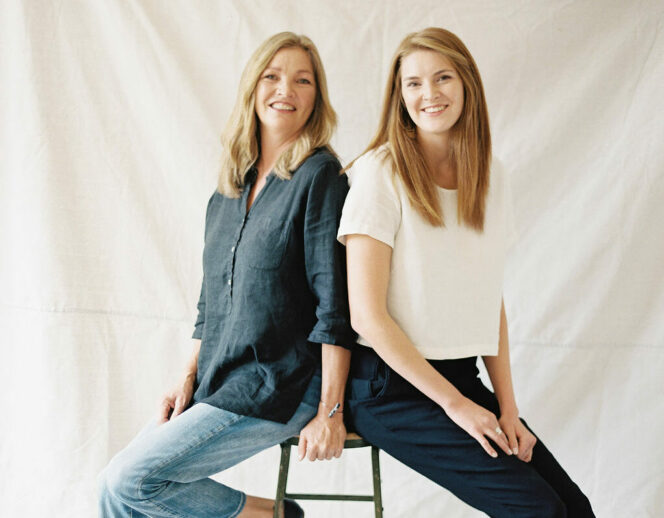
Serenity West; Acacia Cresswell (left) and Sandra Mc
Vancouver has developed a reputation for companies that produce and champion sustainable clothing. From Arc’teryx, which focuses on minimizing environmental impact through the design of their outdoor wear, to Decade Studio, which makes long-lasting jeans, Vancouver-based businesses are paving the way for sustainable apparel.
One amazing sustainable apparel business is Serenity West. The business began when co-owner Sandra McIntyre was working as an interior designer and was getting requests from clients for locally-made products. When she wasn’t able to find anything suitable, she started making linen bedding for them.
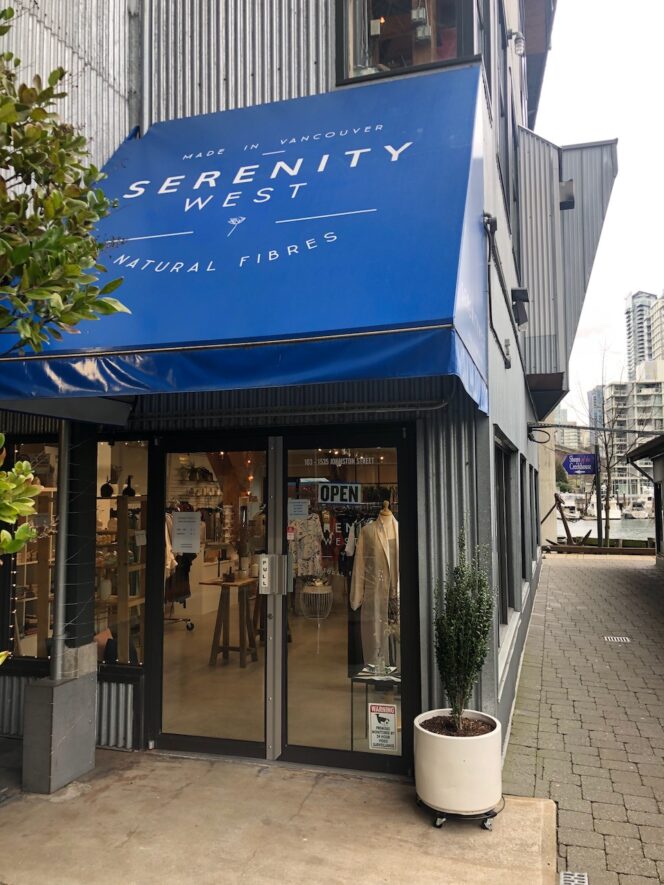
Photo sourced from Serenity West
In 2017, she teamed up with her daughter Acacia Cresswell to launch Serenity West, which sells local, natural, and sustainable clothing and home décor. They started with markets and pop-up shops, and then eventually opened their own retail location.
Rather than fast fashion, the mother-and-daughter duo aim for longevity with their home décor and clothing. “We want you to invest in a piece that you can wear across seasons and pair with a lot of different accessories, so you can wear it for a lifetime or even pass it down,” Cresswell says.
While they keep an eye on trends and popular colours, Cresswell and McIntyre aim for timeless minimalism that reflects the vibe of their home city. “We’re going for spreading a sense of serenity inspired by nature. Vancouver is certainly known for its mountains, ocean, and you can see that in the styles we design,” Cresswell says. Their tapered linen pants are particularly sought after, as are their simple button-down shirts and flowy jackets. They’re expanding into men’s wear this spring.
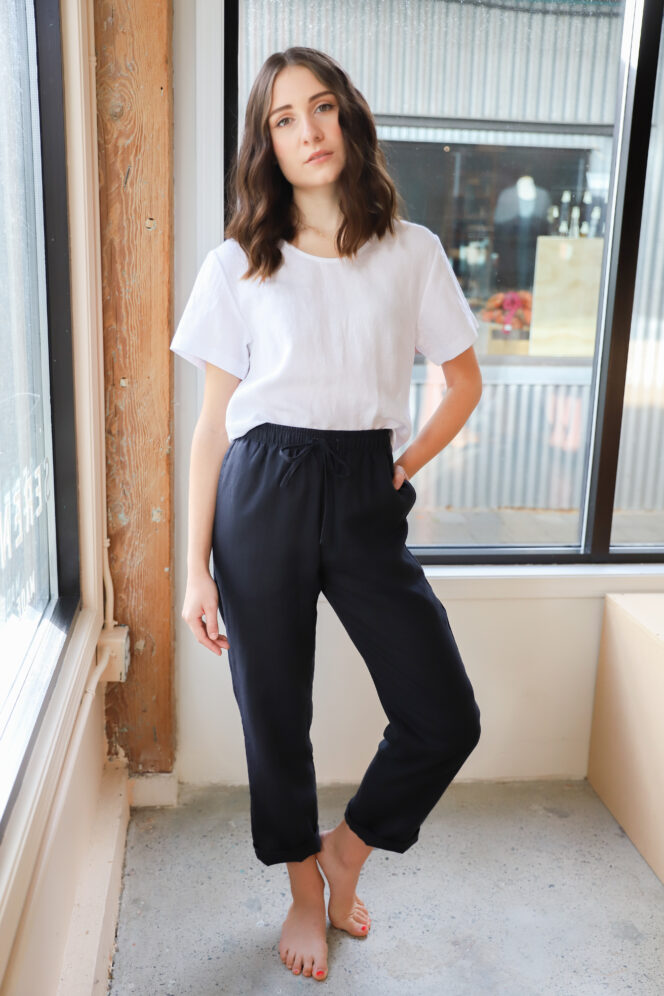
Photo sourced from Serenity West; Lily Tee and Lounge Pant
They primarily use linen to make their clothing because of its eco-friendly qualities. “We started with linen because it’s grown from the flax plant, which requires a lot less water and pesticides than other plants,” Cresswell explains. Linen is great for durability and is biodegradable, unlike many synthetic materials.
Ethics underlie the entire production process, from using every part of the flax plant, to making the clothing locally and responsibly in Vancouver. “We want to make sure that everyone working to create our designs is paid a fair living wage. They have benefits. They have good working conditions,” Cresswell says. And while it has been tempting at times to source other materials, like polyester, she’s proud of Serenity West’s continued commitment to the local and sustainable. “I learned that it’s possible to do that here in Vancouver. It was tough, but possible and rewarding,” she says.
The owners of Hunter & Hare, Micki Cole and Joanne Bousaleh, opened their stores with a strong sense of values as well. Their two boutiques, one in Chinatown and the other in North Vancouver, specialize in consignment apparel and locally-sourced accessories and gifts. Their curated selections are affordably priced, and displayed in charmingly chic retail spaces. The two had both worked in retail clothing and wanted to effect change. “We saw the amount of waste that there can be in the industry, and it’s a little disheartening,” Cole says. She says that 3% of waste in Vancouver is clothing; Hunter & Hare works to reduce that percentage.
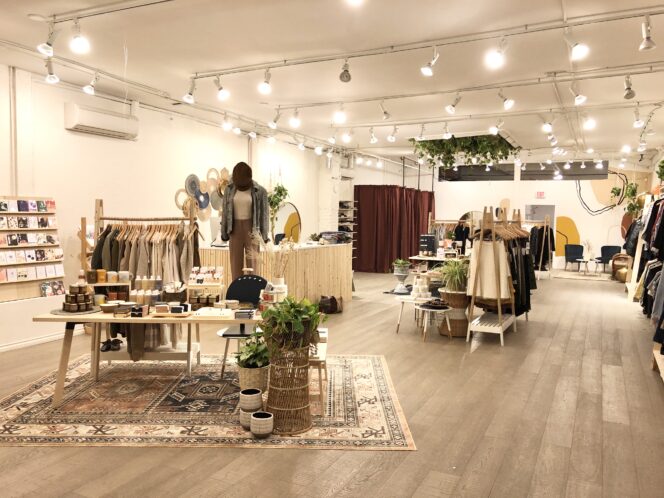
Photo sourced from Hunter & Hare
Not only are they giving clothing new life through their stores, but they also donate what remains unsold to organizations such as MOMS Canada, Harvest Project, and Battered Women’s Support Services (BWSS). What these charities aren’t able to take, Hunter & Hare saves for special big sales, with 10% of their profit from these sales going to charities.
Cole sees Vancouver as a city particularly committed to sustainability. “I think Vancouver is always going to be an eco-forward thinking city, or trying to be, because of where we live. We’re surrounded by beautiful ocean and mountains, and all this wonderful wildlife,” she says. This spectacular natural setting lends itself to caring about sustainability.
Cole stresses the company’s commitment to the community within their stores, in addition to the neighbourhood around them. Their goal is to treat their staff well, with fair wages and benefits, so they stay for the long-term. “I think in retail a lot of times that doesn’t happen. People often don’t think of it as a career,” she says.
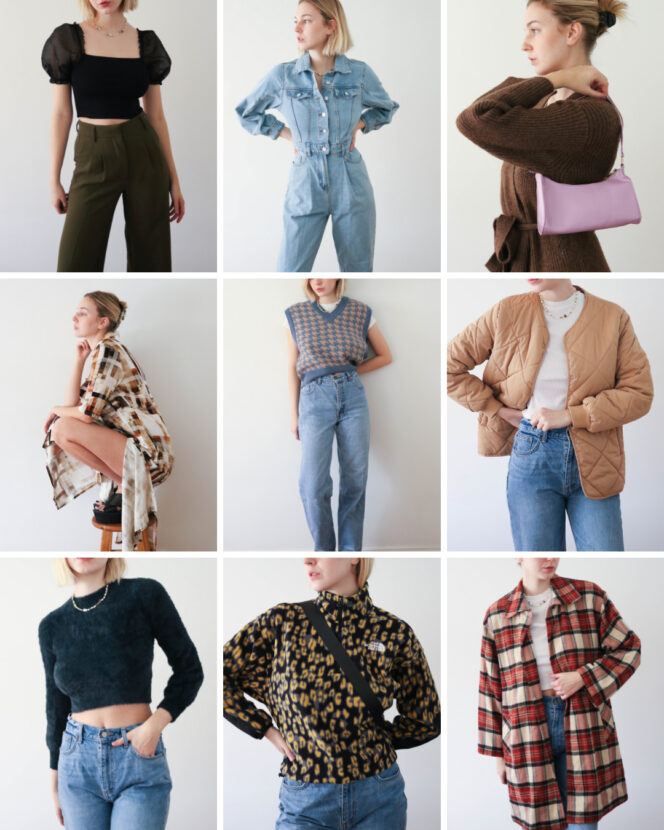
Collage sourced from Hunter & Hare
In addition, Hunter & Hare are attentive to the responsibilities that accompany their Chinatown location and proximity to the now effaced Hogan’s Alley, once the heart of the city’s Black population. On the last Tuesday of every other month, they donate 25% of their sales for the day to a chosen Canadian charity, such as the Vancouver Black Therapy & Advocacy Fund or The Downtown Eastside Women’s Centre. And they provide small grants to local artisans and creators to support them with their endeavours.
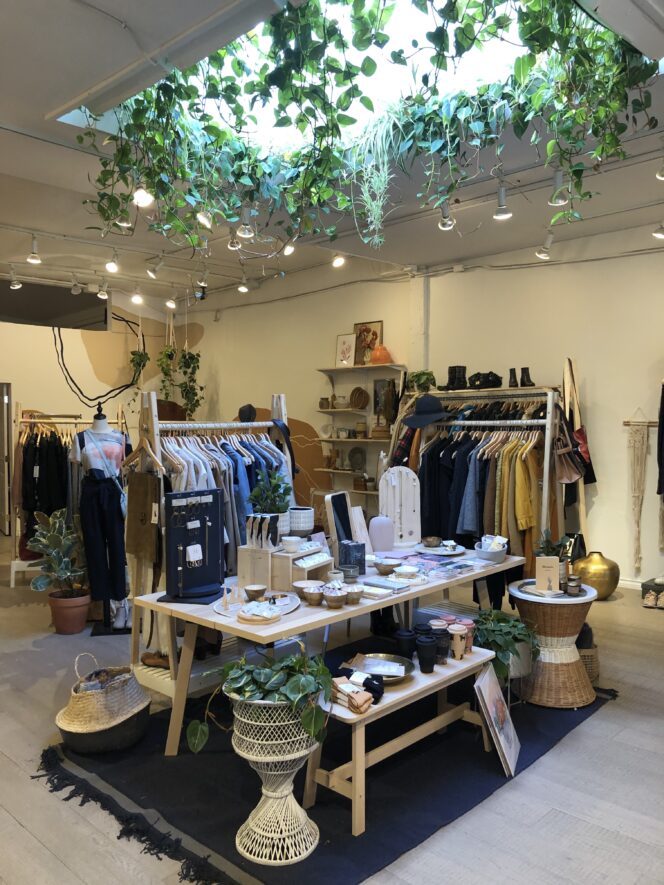
Photo sourced from Hunter & Hare
Turnabout, a luxury resale brand with various locations across the city, also believes strongly in their social and environmental responsibility. Founder Joy Mauro opened the first Turnabout in 1978 on South Granville, back when there was still considerable stigma surrounding both buying and selling consignment clothing. Now, in 2022, clientele see consignment wear as “a badge of honour.” “They’ve gone to seeing it as the right thing to do, trying to lead a sustainable lifestyle. I’ve seen a huge change in that,” she says.
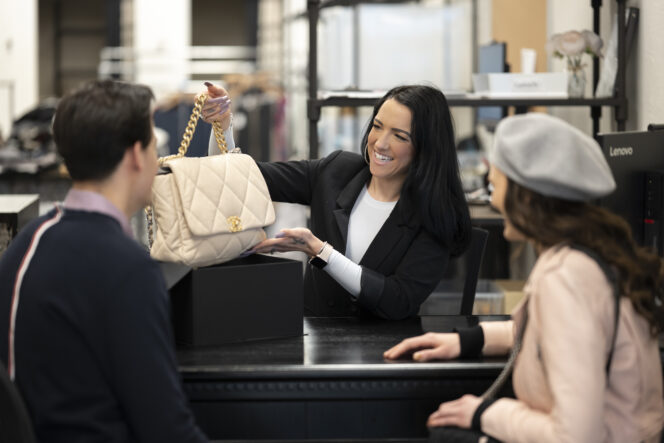
Photo sourced from Turnabout
Mauro feels luxury consignment is the way to go for a multitude of reasons. She says, “We believe that you need to buy quality clothing. It will wash better, it will look better, and it will last longer.” She explains that many high-quality brands are investing in sustainable business practices, making purchasing their clothing and accessories an eco-conscious choice.
Since their products stay like new, the same designer bag, can be easily resold to someone else to enjoy. Mauro, for example, has seen some items brought back to the store two or three times. In some cases, the item will actually appreciate in value. She just bought an Yves Saint Laurent bag, which she intends to eventually resell. “I know that I’m going to use it for the next year, and I’m going to lose very little. I’m going to get most of my money back since it holds its value. So, it’s a smart way to shop from that perspective,” she says.
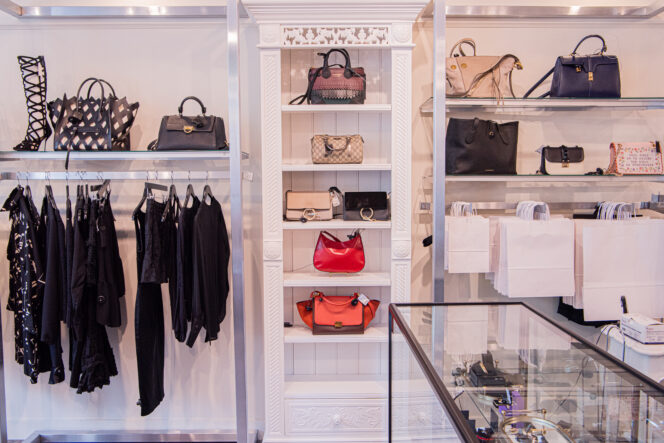
Photo sourced from Turnabout
Turnabout has created a business model that reduces fashion waste. Because there are so many locations, they don’t cherry-pick items when someone comes to a store with clothing and accessories they no longer want. Instead, they help people clear out their closets without sending their things to the landfill. “We’re taking from the Lululemons up to the Chanels. You can do one-stop getting rid of things. We can help people more effectively that way,” she says.
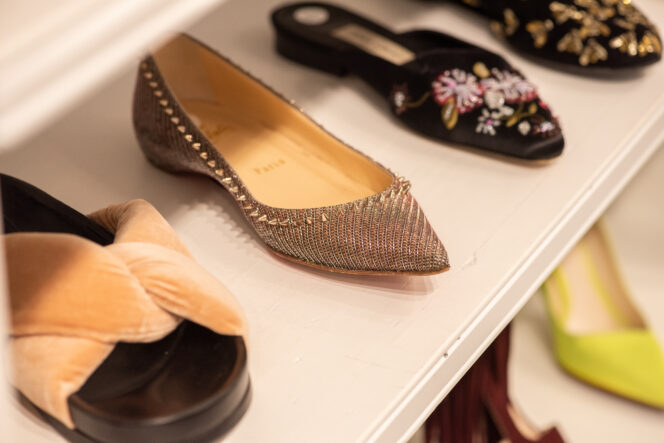
Photo sourced from Turnabout
Mauro recently opened Turnabout Community on Fraser Street for items that don’t always make the cut for their other locations but are still like-new. All profits from this location are donated to Dress for Success Vancouver. Turnabout also donates others items they can’t sell to various charities and non-profit organizations, such as women’s shelters and Big Brothers of Greater Vancouver. Some clothing is even repurposed as rags to limit waste as much as possible.
She sees Turnabout as helping to create a circular economy for their clients who increasingly believe in the need for sustainability. “We try and really help people. If a person wants to do resale and they’re committed to living more sustainably, we’re trying to support that,” Mauro says. Turnabout and so many other fashion companies in the city are doing their part to produce and sell clothing that does less harm to the planet.
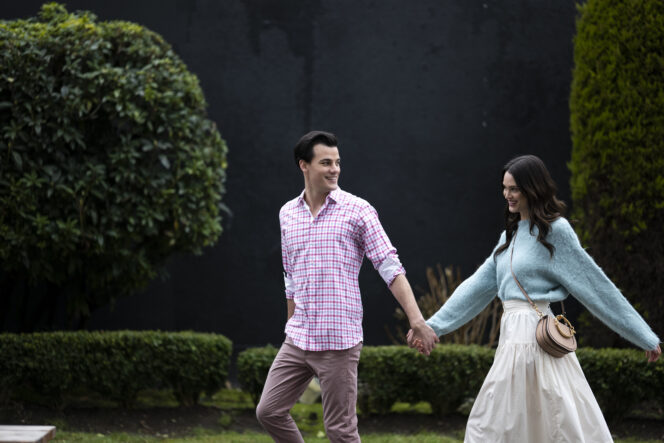
Photo sourced from Turnabout













